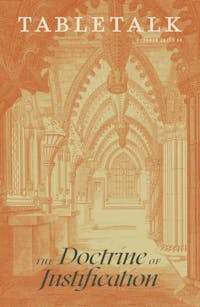
Request your free, three-month trial to Tabletalk magazine. You’ll receive the print issue monthly and gain immediate digital access to decades of archives. This trial is risk-free. No credit card required.
Try Tabletalk NowAlready receive Tabletalk magazine every month?
Verify your email address to gain unlimited access.
Hardly a month goes by when we do not hear of another minister or Christian leader who has fallen publicly. Usually, it turns out that the leader led a double life for years before being caught. With each public fall, commentators scramble to provide a postmortem and to suggest a solution. But the fundamental issue is clear: integrity is in short supply.
Yet, Christians most of all should know the value of integrity. Words must be matched by actions. The public persona must match the private. The Apostle James goes so far as to write this: “But above all, my brothers, do not swear, either by heaven or by earth or by any other oath, but let your ‘yes’ be yes and your ‘no’ be no, so that you may not fall under condemnation” (James 5:12).
Proverbs tells us that this kind of integrity is far more valuable than money: “Better is a poor man who walks in his integrity than he who is crooked in speech and is a fool” (19:1). And integrity—the match between words and actions—brings security. The man living a double life can never feel secure; nor can anyone close to him. In contrast, there is no need for fear of exposure when your words and actions match. Proverbs 10:9 says, “Whoever walks in integrity walks securely, but he who makes his ways crooked will be found out.”
God also promises special protection for those who live lives of integrity. God “is a shield to those who walk in integrity” (2:7). Those who best know a man of integrity have special respect for him. “The righteous who walks in his integrity—blessed are his children after him!” (20:7).
The most prominent Old Testament example of integrity is Job. The word “integrity” is used more in the book of Job than in any other book. It is easy to understand why. When Satan takes away Job’s family and his wealth, the Lord says this about him: “He still holds fast his integrity, although you [Satan] incited me against him to destroy him without reason” (Job 2:3). Job’s wife told him to throw it away: “Then his wife said to him, ‘Do you still hold fast your integrity? Curse God and die’ ” (v. 9). In the midst of Job’s profound suffering, his so-called friends doubted his integrity. They questioned whether his actions and thoughts matched his words. They doubted if he was a man whose “yes” meant yes and whose “no” meant no. But Job would not betray his integrity. What he said about himself was true.
Think about the number of relationships today that are damaged by a failure to heed this example. If children cannot trust the words of their parents, what will be their view of God as a trustworthy heavenly Father? If a wife cannot trust the word of her husband in small matters, how can she retain her confidence in matters of greater significance? If testimony cannot be trusted in a courtroom or a boardroom, the strain on our justice system and our economy would be devastating.
Within the church, integrity of speech is especially important. The church is governed and fed by teaching and preaching—by words. If the same ministers who proclaim God’s Word are untrustworthy when they speak about other matters—if their words do not match their actions—then the foundations of the visible church can be shaken.
On at least one occasion, some in the church at Corinth questioned whether Paul’s “yes” was yes. They accused him of vacillating; they did not think his actions matched his words. Paul understood how serious this charge was and he was emphatic about his own sincerity of speech and integrity of life, writing, “For our boast is this, the testimony of our conscience, that we behaved in the world with simplicity and godly sincerity, not by earthly wisdom but by the grace of God, and supremely so toward you” (2 Cor. 1:12). Regarding the specific charge of saying one thing and doing another, he added, “Do I make my plans according to the flesh, ready to say ‘Yes, yes’ and ‘No, no’ at the same time? As surely as God is faithful, our word to you has not been Yes and No . . . but in him it is always Yes” (vv. 17–19).
Why would the great Apostle Paul expend such energy to refute the charge of saying one thing and doing another? Because his integrity was at stake. His work as an Apostle and a minister of Christ’s Word would be grossly undermined if his words could not be trusted. Paul’s sincere approach, in which every word was spoken in the sight of God and not for personal gain, was a cornerstone of his entire ministry, and it set him apart from other teachers even in his own day. He wrote, “For we are not, like so many, peddlers of God’s Word, but as men of sincerity, as commissioned by God, in the sight of God we speak in Christ” (2:17).
Integrity of speech matters. Everyone in our life needs to be assured that what we say reflects who we really are and what we will really do. James prefaces his command about our integrity of speech with the phrase, “above all” (James 5:12). This is his way of saying that we are to focus on this as much as on anything else in our lives. Whether in the spotlight of Christian ministry or in the privacy of our homes, our “yes” must be yes and our “no” must be no. The stakes, for now and eternity, could not be higher.
